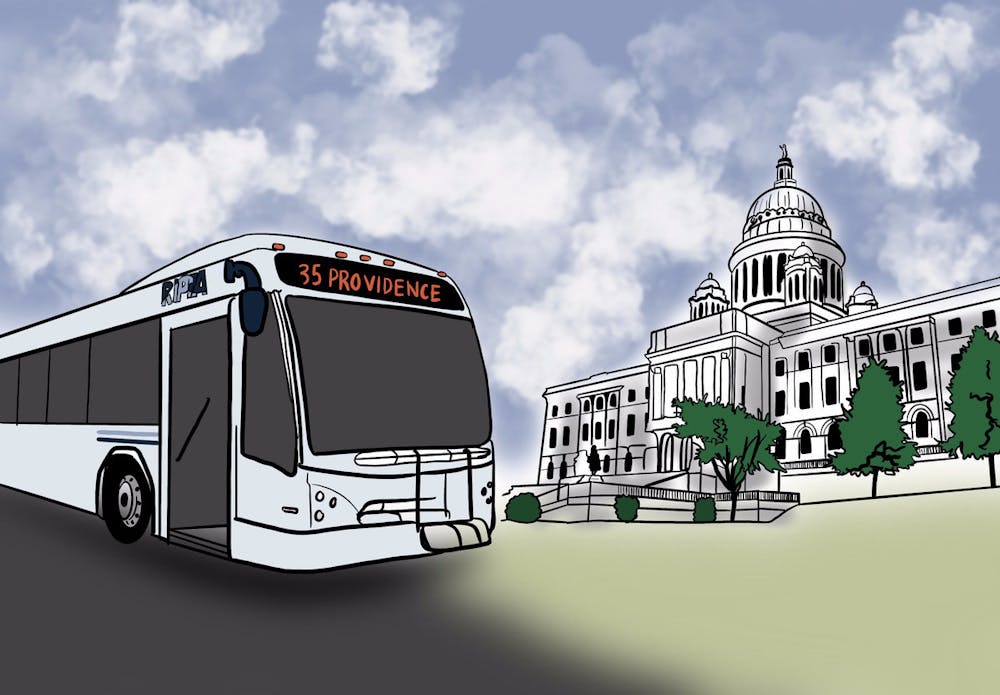Rhode Island State Senate President Dominick Ruggerio (D-North Providence) recently called for the resignation of the Rhode Island Public Transit Authority’s CEO Scott Avedisian and for the merger of RIPTA with the Rhode Island Department of Transportation in a Feb. 17 press release. Ruggerio also called for the state Senate to conduct an oversight hearing on the public transit agency.
Ruggerio’s calls for change follow several tumultuous months for RIPTA. The agency is reportedly headed towards a “fiscal cliff” once federal money — including the $29.6 million in Federal Emergency Relief dollars the agency received due to the pandemic — runs out.
The agency also experienced a driver shortage last fall, which Ruggerio described in the press release as an example of “foreseeable challenges” which were “left unaddressed until there was a crisis.”
Cristy Raposo Perry, spokesperson for RIPTA, linked the authority’s fall driver shortage to a greater labor shortage facing transit agencies nationwide. In an email to The Herald, she cited “pandemic-related health and safety issues, competitor wages, CDL requirements, assaults against drivers and a lack of interest from the younger workforce” as obstacles to recruiting drivers.
RIPTA also recently faced criticism for granting a contentious “no-bid lobbying contract,” according to a Senate press release, which added that the decision was made without consulting the RIPTA board.
In January, The Providence Journal reported that former Mayor of Cranston and Republican candidate for Congress Allan Fung’s lobbying firm was granted a deal with RIPTA. Avedisian was formerly a Republican mayor of Warwick.
By mid-February, the board had directed RIPTA to either “dissolve the contract and/or select another (lobbying firm) staff member to manage the contract,” the Providence Journal reported.
“It is inaccurate to refer to the lobbyist contract as a ‘no-bid contract,’” Perry wrote. She added that RIPTA followed state laws in developing the contract with Fung and noted that the RIPTA board “has also delegated authority to the CEO to execute contracts under $100,000.” She added that as a state agency, “RIPTA does not have ‘political’ allies.”
Patrick Crowley, secretary-treasurer of the R.I. American Federation of Labor and Congress of Industrial Organizations and a RIPTA board member, said he supports Ruggerio’s calls for Avedisian to resign in part due to the perceived lack of transparency.
“In my short time on the Board of Directors, I’ve been exceedingly frustrated with the lack of transparency and what I perceive as treating the board as only a rubber stamp for agency decisions,” Crowley said. “It should be the Board of Directors itself that is driving an agenda to make sure RIPTA is as strong of an agency as possible.”
Perry noted that RIPTA is “consistently transparent, accessible and responsive to its board.” She added that Avedisian has moved to further the agency’s transparency by agreeing to notify the board of pending contracts prior to their signing, a move not required by RIPTA regulations or law.
Crowley called for a national search to replace Avedisian, explaining that RIPTA is “so important that we need to find the best person in the country that could lead this agency.” He explained that RIPTA’s function as a complex urban, suburban and rural transportation system all in one requires significant expertise to run.
A potential merger: more funding, but at a cost?
According to Crowley, the potential merger between RIDOT and RIPTA may have been proposed by Ruggerio to address the financial edge RIPTA is teetering on.
“I think (RI)DOT is well-positioned to leverage not just state money, but a lot of federal programs,” Crowley said. “My concern would be, would RIPTA be able to get the attention that it really deserves under a larger umbrella? And would it be treated as an afterthought as opposed to a primary mission?”
Patricia Raub, co-chair of Rhode Island Transit Riders, expressed similar concerns. She said that RIPTA is more public-facing than RIDOT and feels that the agency would be more likely than RIDOT to collaborate with riders to ensure their needs are met.
“RIDOT is car-centric,” Raub said. “It is not very transparent. It does not consult with the public very much at all. And it’s come up with some pretty bad ideas with regard to public transit in the last few years.”
Raub said that under Avedisian, RIPTA has applied for “pretty much every grant which it is likely to get.” Still, she acknowledged remaining concerns about the agency’s financial situation, especially considering the declining gas tax in the state, which has historically been used to fund some of RIPTA’s operating expenses.
“That’s got to be dealt with, or we’re going to see service cuts, which are going to perhaps lead to a downward spiral in riders,” Raub said. “If you can’t get the bus you need when you need it, then people are going to stop riding the bus.”
Sen. Meghan Kallman (D-Pawtucket, Providence) said a potential solution could be implementing a surcharge on miles traveled or vehicle weight rather than on gas so that a sustainable funding stream remains even as the state moves towards higher electric vehicle use.
Looking forward: oversight hearings and long-term solutions
Raub said she thinks Rhode Island’s transit woes are unlikely to be solved by Ruggerio’s proposed measures. Ultimately, Raub said money from the state will be essential not only in the implementation of the state’s Transit Master Plan, Transit Forward RI, but also to the very survival of RIPTA as an agency.
“There is no place (RIPTA) can reduce its budget without cutting service,” Raub said. “I do think that (RIPTA) should be doing more lobbying in the legislature, and unfortunately their lobbying effort got off to a bad start.”
Kallman said that the state holds the responsibility for RIPTA’s current financial distress. She described several bills in the works that aim to increase funding for the transit agency. One would enact a surcharge on Uber and Lyft rides, mirroring a similar policy in Massachusetts. Half of the surcharge money would go towards creating “complete streets,” which Kallman described as a process of enhancing walkability and the number of protected bike lanes and bus shelters on Rhode Island’s streets. The other half would go towards funding the Transit Forward RI, a project Kallman deemed overlooked for far too long.
“We have not, as a state, made serious commitments to funding the Transit Master Plan, we have not made serious commitments to funding RIPTA, and we frankly haven’t made very serious commitments to funding public transit as a whole for a long period of time,” she said.
As for calls for a senate oversight hearing, Raub explained that while she doesn’t see it as necessary, R.I. Transit Riders is not opposed to them. “I don’t think that RIPTA has anything to hide,” she said.
Crowley, on the other hand, said an oversight hearing is “absolutely necessary,” especially in light of unresolved questions lingering from last year’s oversight hearing on RIPTA after a data breach that impacted thousands of people.
Crowley emphasized that ironing out RIPTA’s current issues is essential to him because, as he sees it, the agency represents much more than public transit.
RIPTA “is a key to our democratic infrastructure in Rhode Island,” he said. He said that one of the things he loves about public transit the way in brings together vastly different people, with riders of all races, gender identities, ages and economic classes utilizing the bus.
“Fundamentally, if we’re going to really protect our democracy in the state, we’ve got to all have a stake in the resources that are part of what makes Rhode Island great,” he said. “That’s why RIPTA is not just a bus system, it really is a cornerstone of our democracy, and I think that’s why it needs to be protected and enhanced.”

Yael is a senior staff writer covering city and state politics. She is junior, and hails from the Bay Area.





